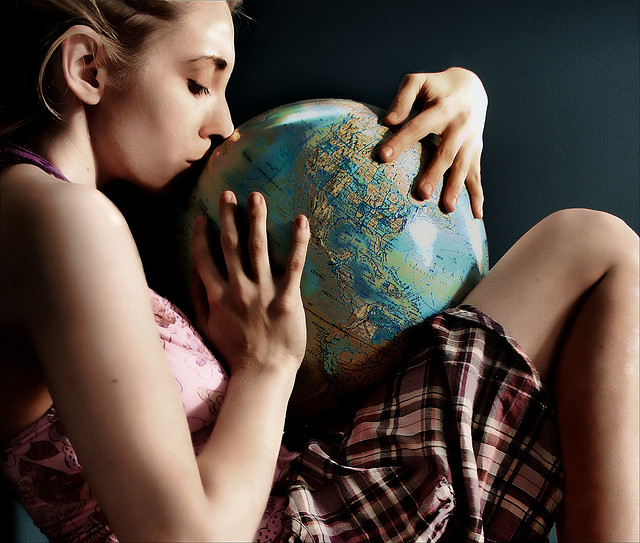At any given moment there are a million horrible realities playing out in this world.
As I read through the headlines, blog posts and tweets surrounding the violence and violations of human rights in the world these past couple weeks, I find myself feeling overwhelmed with emotion: quick sadness for these realities; anger at the messiness of the world; frustration for my total isolation and powerlessness paradoxically mixed with guilt that I must somehow, through the modern age of global capitalism, be connected to and likely contributing to these situations.
I had a nightmare about the violence—followed by awakened guilt over the fact that I could feel frightened by a figment of my imagination based off no lived experience, while actual suffering is true, real and daily for so many.
But what can I do?
Mindfulness meditation teaches us a way of processing our own sensational experiences so that we can then act emotionally authentically. I’ve been trying to sit with this idea this week, contemplating how one could possibly respond to these situations as a responsible and empathetic member of the global community.
But my sadness at the state of affairs without potential for action left me feeling egocentric.
Holding, examining and fully experiencing the sadness left me feeling like I was making the suffering too much about me. But the more the situations developed, the more my chest tightened up. What could I do with that?
I know, intellectually, that my sadness is valid and appropriate, and I don’t need to push it away just because my ego feels too self-centered. But how can I process what I am stirred to feel in a way that is not only for the sake of my desire to do something with my “self-centered” sadness, but for the good of the world around me?
And then I realized, how can I do anything but? Here’s the thing: the messiness of the world is everywhere. I wondered, then, if I can sit with my grief, accept my helplessness and inability to truly fix anything and then find ground for compassion to move from there, to move where I am able to move. Can I examine what qualities of violence are still present in myself and my relation to all that I do relate to, and work from there?
I know the mantra: if we change ourselves we change what happens around us. Or, to pull out a Gandhi quote:
“We but mirror the world. All the tendencies present in the outer world are to be found in the world of our body. If we could change ourselves, the tendencies in the world would also change. As a man changes his own nature, so does the attitude of the world change towards him. This is the divine mystery supreme.”
I can’t reach around the globe. Even if I could, I cannot stop what is happening. I’m universally insignificant. But the mirror is two ways. The poet Rumi taught that we are “not a drop of water in the ocean,” but “the entire ocean in a drop of water.” We cannot reach the rest of the ocean, but that doesn’t mean we cannot contain it in ourselves, and act as a part of the whole.
I know what I can do—I can recognize these patterns of human interaction that spur this mass, though perhaps distant, violence. At any given moment there are a million horrible realities playing out in this world. But, at their core, they come from what’s in the hearts of people.
On some scale, we embody the same pendulums as every compassionate or malevolent world leader, affecting the systems we touch in a much smaller, but just as powerful, way.
So what I can control is what’s in my heart.
I can send my sadness and empathy out from my being and across the globe, but I cannot do that without also reaching the manifestations of these patterns in my community—and that should not be overlooked. The problems at the root of all the issues of major violence today are also present in our neighborhoods: separation, anger, greed and fear, for starters.
The patterns, defenses, and aggressions are all happening right where ever I am, too. I believe we can sit with the sadness and grief for human beings around the world and when we feel moved to do something, we can turn to look around us. As author David Orr put it:
“[The planet] does desperately need more peacemakers, healers, restorers, storytellers and lovers of every kind. It needs people who live well in their places. It needs people of moral courage willing to join the fight to make the world habitable and humane.”
We can take in the sadness and grief and horror spurred by the violence and oppression happening around the world and use that call to awaken our consciousness to the calls for justice in our immediate communities. Eyes glued to the television, learning of the sadness far away from us, we may be ignoring the needs of our neighbors that go unmet—tangible needs like food and shelter, but also emotional needs like compassion, community, openness and support.
Can we pay attention to the world?
Can we be open to sitting with our sadness and existential helplessness, and let that be our call to live better in our places?
Can we start there?
Love elephant and want to go steady?
Sign up for our (curated) daily and weekly newsletters!
Apprentice Editor: Kim Haas / Editor: Travis May
Photo: Mysi via Flickr









Read 0 comments and reply